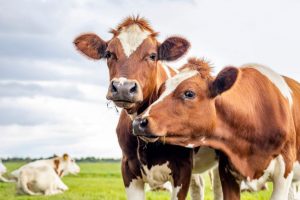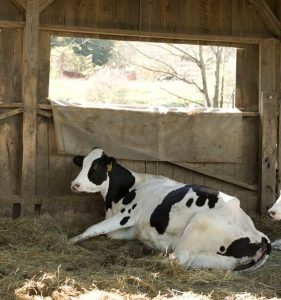Supplements play a crucial role in maintaining the health, productivity, and overall well-being of dairy cows.
1. Calcium
Calcium is vital for dairy cows, especially those in the early stages of lactation. It plays a key role in milk production and skeletal health. A deficiency in calcium can lead to conditions like milk fever, which is common in high-producing dairy cows. Providing calcium supplements, particularly around calving time, helps maintain proper levels and supports overall cow health. Examples of feeds: limestone, dicalcium phosphate, alfalfa hay.

2. Phosphorus
Phosphorus works in tandem with calcium to support bone health and metabolic functions. It is also essential for energy metabolism and milk production. A balanced ratio of calcium to phosphorus is crucial to prevent deficiencies that can lead to poor growth, reproductive issues, and decreased milk yield. Phosphorus supplements help maintain this balance, promoting optimal health and productivity. Examples of feeds: dicalcium phosphate, monocalcium phosphate, soybean meal.

3. Magnesium
Magnesium is essential for enzyme function, nerve transmission, and muscle contraction. Deficiency in magnesium can result in grass tetany, a potentially fatal condition. Magnesium supplements, often provided through mineral mixes or licks, help prevent this condition and support overall metabolic health. Examples of feeds: magnesium oxide, dolomitic limestone, legume hays (e.g., clover, alfalfa).
By the way you should Note that our company can help you to start by giving you all the necessary information you need to get started if not yet in the business. Please check our online shop, we have all the standard business proposals for different capacities at very a cheap price made by the best agricultural specialists as well as Standard design plans that are made by the best agricultural architects around the globe. please visit our online shop now using the links below to witness by yourself
Design plans (FARM HOUSE DESIGNS – Kimd Construction & Farm Consultants)
Business plans (BUSINESS PLANS & PROPOSALS – Kimd Construction & Farm Consultants)
Welcome back from visiting our shop, hope you have placed your order for any of our products or you can place it after navigating more of our informative articles.
So let’s continue with our article! In this blog article!
4. Sodium and Chloride (Salt)
Sodium and chloride are crucial electrolytes that regulate fluid balance, nerve function, and muscle contractions. Dairy cows typically receive salt in their diets to ensure they meet their sodium and chloride needs. Providing salt blocks or loose salt helps maintain proper hydration and supports digestive processes. Examples of feeds: salt blocks, loose salt, mineral licks.
5. Potassium
Potassium is important for maintaining fluid balance, nerve function, and muscle contractions. It also helps in managing heat stress, which is particularly important during hot weather. Potassium supplements can be added to the diet to ensure cows meet their daily requirements, especially during periods of high milk production or stress. Examples of feeds: potassium chloride, beet pulp, alfalfa.
6. Vitamins A, D, and E
Vitamins A, D, and E are essential for various physiological functions. Vitamin A supports vision, immune function, and reproductive health. Vitamin D is crucial for calcium and phosphorus absorption, bone health, and immune function. Vitamin E acts as an antioxidant, protecting cells from damage and supporting immune health. These vitamins are often included in fortified feeds or supplements to ensure cows receive adequate amounts. Examples of feeds: fortified grain mixes, alfalfa hay, fish oil.

7. Selenium
Selenium is an essential trace mineral that works with vitamin E to protect cells from oxidative damage. It plays a critical role in immune function, reproduction, and preventing conditions like white muscle disease. Selenium supplements are often provided through mineral mixes or injectable forms to ensure adequate intake. Examples of feeds: selenium-enriched mineral mixes, grains, pasture plants grown in selenium-rich soil.
8. Rumen-Protected Amino Acids
Rumen-protected amino acids, such as methionine and lysine, are crucial for protein synthesis and overall milk production. These amino acids are formulated to bypass the rumen and be absorbed directly in the intestines, ensuring they reach the bloodstream and are available for use in the body. Supplementing with rumen-protected amino acids can improve milk yield and composition. Examples of feeds: rumen-protected methionine, rumen-protected lysine, soybean meal.

9. Probiotics and Prebiotics
Probiotics and prebiotics support gut health and improve nutrient absorption. Probiotics are live beneficial bacteria that enhance the gut microbiome, while prebiotics are non-digestible fibers that feed these bacteria. Including probiotics and prebiotics in the diet can improve digestion, enhance immune function, and increase milk production efficiency. Examples of feeds: yogurt, silage, inulin.

10. Yeast Culture
Yeast culture supplements promote rumen health and function by stabilizing pH levels and enhancing fiber digestion. This leads to improved feed efficiency and milk production. Yeast culture can also help reduce the risk of rumen acidosis, a common issue in high-producing dairy cows. Including yeast culture in the diet supports overall digestive health and performance. Examples of feeds: yeast culture products, brewers’ yeast, distillers grains.
Conclusion
Supplementing the diet of dairy cows with essential nutrients is vital for maintaining their health, productivity, and overall well-being. Calcium, phosphorus, magnesium, sodium, chloride, potassium, vitamins A, D, and E, selenium, rumen-protected amino acids, probiotics, prebiotics, and yeast culture are among the top supplements that can benefit dairy cows. By ensuring that cows receive these nutrients, farmers can enhance milk production, support reproductive health, and improve the overall efficiency and sustainability of their dairy operations.




